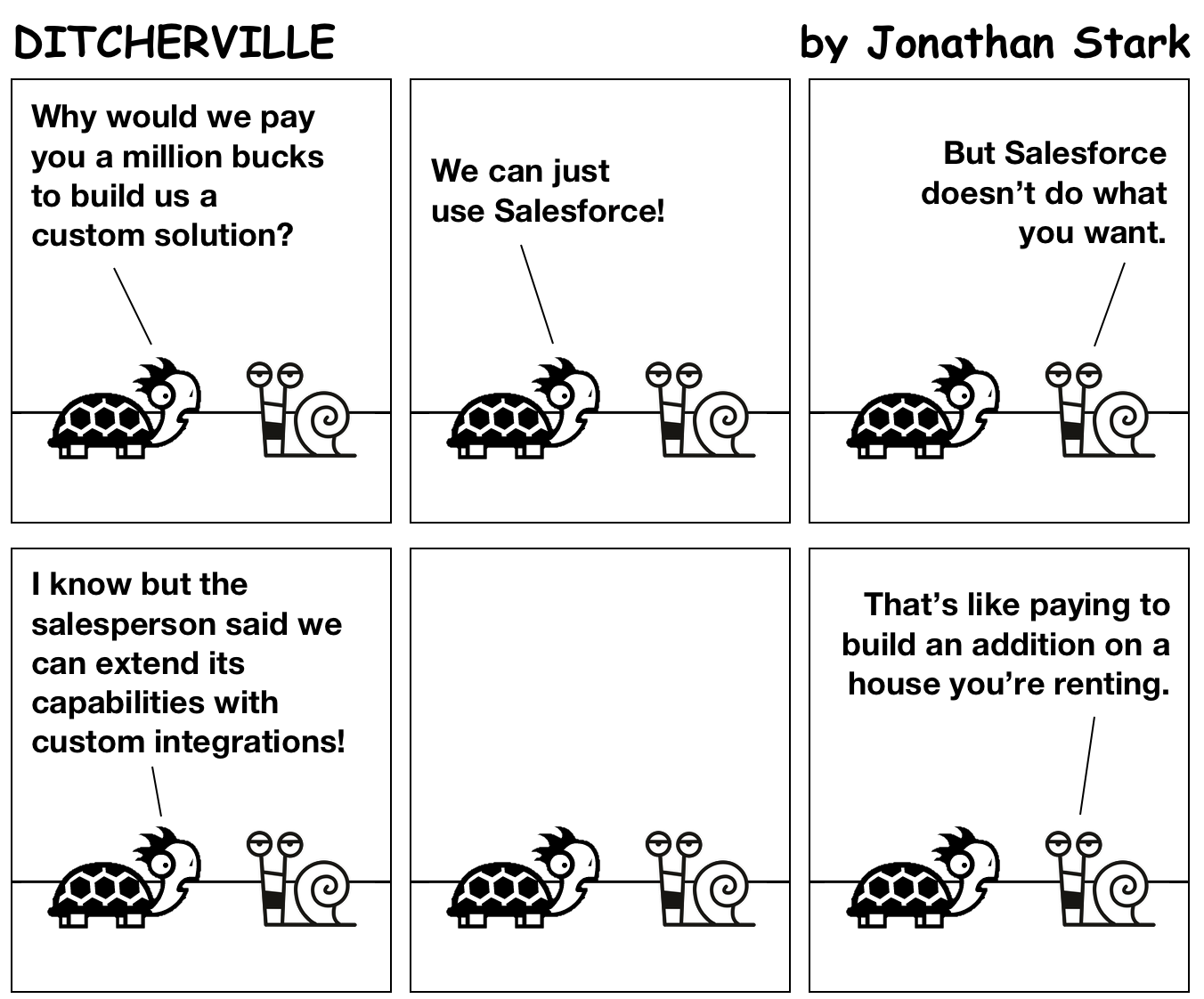WordPress vs Custom Website Development: How to Decide
To begin with, we need to address the elephant in the room. We’re a custom software development shop, our bread and butter is using the tools that are lingua franca to the web, which means we fall on the side of custom website development. But that doesn’t mean that WordPress doesn’t have a place, in-fact it is estimated to have 43% of the website market under its belt, you can’t do this without doing something right.

Mar. 4, 2023 1341 words
To begin with, we need to address the elephant in the room. We’re a custom software development shop, our bread and butter is using the tools that are lingua franca to the web, which means we fall on the side of custom website development. But that doesn’t mean that WordPress doesn’t have a place, in-fact it is estimated to have 43% of the website market under its belt, you can’t do this without doing something right.
TL:DR
For the quick synopsis however, WordPress is a fine tool for hosting your website. If you need a couple of plugins to get a bit more basic functionality you should be OK. However, if you start needing to actually work with data for your website or you start needing to integrate with other platforms, you could end up needing something custom. To better understand this, we need to have a discussion about your philosophy of use.
Philosophy of Use
The key to navigating this question is understanding your philosophy of use. Can you answer these questions:
- What do you need your website to do for you?
- What do you need your website to integrate with?
- How do you measure performance?
- How much time and/or money do you want to spend on maintenance? (Plugins are built to work with themselves, in an ecosystem full of plugins they can step over each other’s toes.)
- How much time and/or money do you want to spend on security?
- What do you want your developer pool to look like?
Before we dig into this discussion, we need to get one thing straight, the topics we discuss are not absolute. There are always caveats to the rule. But we’re basing our thoughts off of many client discussions. Of which, we’ve found a number of common threads.
Web Design vs. Web Development
Before we can dig into you philosophy of use, we need to think a little bit about web design vs web development. In today’s world of technology those two terms are used usually interchangeably, with an extreme emphasis on web design encompassing the entire gamut. The problem: they are not the same thing!
Web design is that of what you see inside of your browser, it is the look and feel of the website itself. It is what you see while you’re scrolling, it is what you interact with when you typing in fields and pushing buttons.
Web development this is what is running behind the scenes that gives your website features and functionality. Where web design is the muscle and tendons of a web project that can react to buttons presses and swipes. It is what assembles the content together that you can see via web design on the front end.
Although this is not entirely true (some websites can be made completely of just the frontend web design components and not include any functionality really), these two components come together to make a web site work.
What is WordPress
Now that we’ve laid down some ground work for your philosophy of use and what web design is and isn’t, we can now talk a bit more about what WordPress itself is.
WordPress is a full content management system, in its essence it is a deployed package of web design and web development together. In which case you hire a “designer” to theme and style, and the web development work is largely handled by the WordPress core developers and a plethora of plugin developers.
What you get then, is a general purpose web site platform that can handle a set of strict use cases well (web pages and blog posts), and a series of plugins that try to a priori understand your very use cases.
Integration; what’s that?
You get started on your website, you have a good homepage setup as well as great supporting pages. After working for some time you realize that you need to get data from website.xyz. You talk to your designer, they kind of shrug their shoulders and say I’ll look. The first place that is checked is the plugin repository, shucks no luck.
So they start looking at the website that you need to integrate with. You’re in luck, they provide an api. All you need is an api key, a programming language that can talk to the api ( which is often provided with an SDK). There is just one problem, your designer isn’t sure what an API is, and they’re not quite sure how to use it.
Again, I’m not saying this is always the case, but I have run across it frequently.
The plugin problem
There is a problem that I see commonly in the web WordPress and development circles that I frequent. Plugins don’t always meet the needs. There is often times just something different that is needed. This breaks down into a couple different cases though.
- A plugin exists, but I need it to do something different
- Plugin A conflicts with plugin B, I can’t install both of them, but I need both of them.
- Security (a plugin isn’t updated promptly and represents a security risk)
Developer Pool
I need to reiterate a statement I made before, this is just a general observation of working with clients and discussing the “web designers” that they’ve worked with in the past.
The common thread is that most web designers in the WordPress space know how to install a theme into WordPress and build out your content for you with that theme. They may also know how to use something like Elementor to get a more custom feel for you site. They also can install a few plugins that you think would be needed and get some extra functionality for you.
If this meets your philosophy of use that is great, then that is a fine web site provider for you to go with. The challenges then come when you need something not quite off the shelf created for you grand vision. This is when you need to start reaching out to a custom website developer or agency. Often times, WordPress is not their platform of choice. The decisions that go into making WordPress great for general use cases, makes it difficult to get custom development accomplished.
What is custom website development
 Jonathan Stark – Ditcherville #96 - We can just use salesforce
Jonathan Stark – Ditcherville #96 - We can just use salesforce
I really like this comic above. Jonathan Stark used Salesforce as an example, but that can easily be exchanged for WordPress. Because of the general use case nature of WordPress there is no reason to believe that building something on top of their platform with stay consistent. A feature which you rely on, could easily be deemed obsolete and dropped from the code base.
This is where your custom website developer comes into play. They are someone that knows the fundamental building blocks of the web. Not only the presentation layers (or web design), but the backend (web development) components to get everything tied together and working smoothly.
At High creek software we’re well versed in building responsive frontends that look good on mobile devices, to integrating with whatever platform you need to make you web site (actually a web application) work as needed. This includes all of the database work and functionality to tie it all together.
Concluding thoughts
WordPress is a fine platform for a brochure style website. Once you start needing to add additional functionality you need a method to determine if the plugins available will meet your needs, within an acceptable risk range. Ideally you need to be able to determine this (via your philosophy of use questions for you website) before you begin.
The challenge with this, if you wait until you’ve spent all of your budget and then find out that WordPress isn’t going to meet your needs then what do you do?
You can work with us to get your project laid out. We’ll help you understand your project needs and determine if WordPress would fit your needs or if it would make sense to look into something more custom.